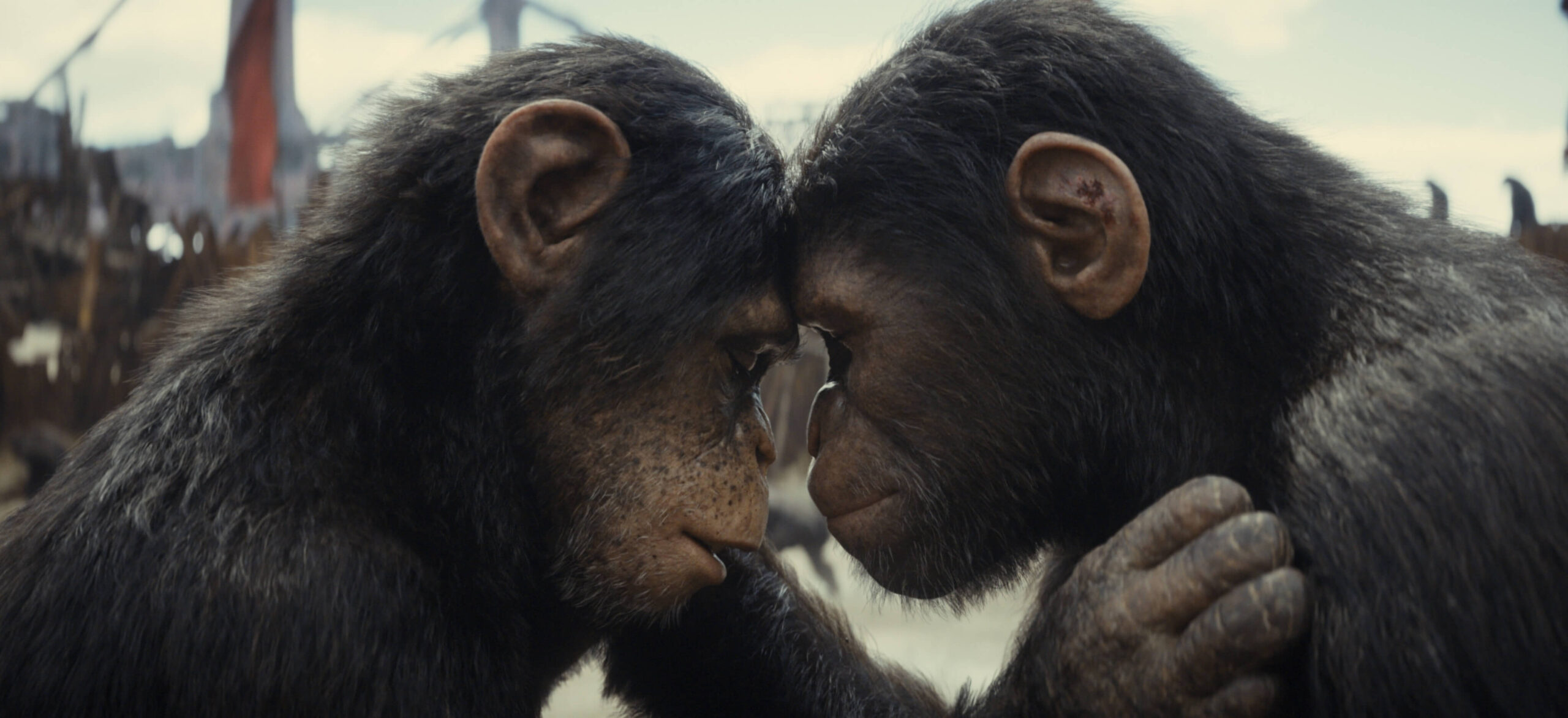What is heritage?
That’s a question asked by Kingdom of the Planet of the Apes, the latest installment of the longest-running sci-fi film franchise in history, playing now in theaters.
In 1968 the first Apes movie, starring Charlton Heston and co-written by The Twilight Zone’s Rod Serling, featured astronauts crash-landing on a seemingly distant planet ruled by super-intelligent apes. In one of the most iconic scenes of the 1960s, at the end of the movie Heston’s character sees a half-destroyed Statue of Liberty sticking out of the sand, realizes he’s been on earth all along, and cries: “You finally, really did it. You maniacs! You blew it up!”
Heston wasn’t talking about the apes. He was talking about human beings, who had destroyed their planet through nuclear war.
The new Kingdom of the Planet of the Apes is set on an ape-ruled earth three hundred years later. Director Wes Ball is a fan of the series, in particular the 1968 original, and makes nods to it throughout the new film.
The backstory to this Apes saga involves a scenario that’s not so outlandish in the post-COVID era: a virus escapes the lab where it was created and accelerates the intelligence of apes, while having a detrimental effect on humans, wiping out most of them.
The central character in earlier films is Caesar, an ape raised by a human who eventually has to choose between his guardian and his fellow apes. He chooses his own kind but still cares about humans and establishes rules for coexisting with them.
In a flashback at the beginning of Kingdom, Caesar is already dead and has become an object of veneration for his fellow apes. Caesar is the apes’ founding father, their Moses, even their messiah. The walking and talking primates don’t seem to have any other faith or tradition beyond Caesar and his legacy.
Kingdom’s lead character is Noa (Owen Teague), whose name is surely as symbolic as Caesar’s. Most of the film takes place many generations after Caesar’s death, when a rapacious ape army is led by Proximus Caesar (namesake of, but no relation to, the apes’ founder, and played by Kevin Durand). He and his vicious band seek to expand their dominion by acquiring mankind’s old technology, and they’re prepared to murder or enslave other apes and humans to get it.
Proximus’s apes have no guiding philosophy; their aim is simply power. Yet they rationalize their mission by invoking the old Caesar’s name, with no thought to whether they are representing his laws and legacy accurately. After decimating Noa’s clan, Proximus stands atop a corpse of an ape he murdered to declare “For Caesar!”
But Caesar’s actual commandment, what he called “first law”? “Ape shall never kill ape.”
These apes couldn’t be further removed from their lawgiver’s original intentions, especially in war. A popcorn movie like this makes the point crudely, but the distortion of a founding heritage is something Americans who reflect on their leaders’ rhetoric will find familiar.
President George W. Bush once said, “George Washington’s long struggle for freedom has also inspired generations of Americans to stand for freedom in their own time. Today, we’re fighting a new war to defend our liberty . . . As we work to advance the cause of freedom around the world, we remember that the father of our country believed that the freedoms we secured in our revolution were not meant for Americans alone.”
Doesn’t everyone remember George Washington’s dream to democratize Iraq?
The most likable character in Kingdom is Raka (Peter Macon), an evolved orangutan who seems to be one of the few apes who remembers Caesar’s true legacy. The choice to portray him as an orangutan is deliberate—other than humans, they are the only great ape in real life with a capacity to recall the past.
Raka teaches the younger Noa that Caesar forbade apes to kill one another and that their founder’s creed was “apes together strong”—the opposite of the ethos driving Proximus, even as he acts in the name of Caesar.
The older ape also teaches Noa compassion for a human girl they come across, Nova, later called Mae (Freya Allan), who was following them for food. “Humans were important to Caesar so they are important to me,” says Raka. He tells Noa that Caesar stood for “decency, morality, strength,” in that order.
In Kingdom of the Planet of the Apes, Noa seeks a better future for his apes by returning to the greatest figure of the past.
The more Noa is exposed to Raka, the more his ideas and words evolve: a teacher and the tradition he transmits bring about a moral evolution as profound as the biological evolution caused by the virus long ago.
And the more Noa learns the truth about his heritage, the clearer the contrast with Proximus’ twisted representation of Caesar becomes. Proximus has lied for so long he doesn’t even know he’s not celebrating his heritage but debasing it.
Heritage is what defines and enriches a people, if it’s respected and viewed properly. “Tradition is the democracy of the dead,” G. K. Chesterton famously wrote. “It means giving a vote to the most obscure of all classes: our ancestors.”
In Kingdom of the Planet of the Apes, Noa seeks a better future for his apes by returning to the greatest figure of the past. In knowing the true Caesar—his original spirit, not just his name—he better understands the nature and purpose of his “people.”
Kingdom is the best and richest movie in the last twenty-five years of the series, as well as a showcase for CGI done right. It’s also a film about recovering our culture and heeding our forefathers at their wisest.















